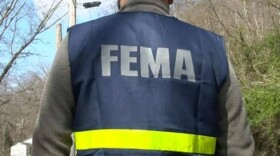Robert F. Kennedy Jr. appears likely to soon be taking the helm as Secretary of the Department of Health and Human Services. The Senate Finance committee voted along party lines, 14-13, to favorably report his nomination to the full Senate.
A vote to confirm him likely will happen in the coming days or perhaps next week.
President Trump has so far succeeded in installing most of his preferred cabinet picks despite slim Congressional majorities. Kennedy was one of his most contentious nominees.
Kennedy is a very unusual choice to run the nation's health agencies, which include Medicare, the Food and Drug Administration, the National Institutes for Health, and more. A scion of the famous Democratic family, Kennedy spent years as an environmental advocate before pivoting to anti-vaccine work. That work built his reputation and fortune.
Senator Bill Cassidy, R.-La., cast a key vote in favor of Kennedy. A physician, Cassidy spoke in personal terms during hearings last week about his experiences with patients who suffered from lifelong health consequences because they were unvaccinated. He indicated on Thursday he was "struggling" with the decision, but ultimately voted in Kennedy's favor.

On social media Tuesday, Cassidy posted: "I've had very intense conversations with Bobby and the White House over the weekend and even this morning. I want to thank VP JD [Vance] specifically for his honest counsel," he wrote. He added that he decided to vote in favor of Kennedy after receiving commitments from the Trump administration and "the opportunity to make progress on the issues we agree on like healthy foods and a pro-American agenda."
Overcoming opposition from many sides
Democratic Senators stayed united in opposition to Kennedy, including his former law school classmate Sen. Sheldon Whitehouse, D.-R.I., and Sen. Bernie Sanders, I.-Vt., who has agreed with Kennedy in the past about problems with the food industry.
Since Trump announced Kennedy's nomination, he's faced fierce opposition from the left. An ad campaign from the left-leaning advocacy group Protect Our Care targeted select Republican senators and portrayed Kennedy as an anti-vaccine extremist. He also faced opposition from the right because of his past support of abortion access — former Vice President Mike Pence's group Advancing American Freedom also ran ads against him. Thousands of physicians and scientists wrote letters opposing his nomination. Also, just before he was set to appear on Capitol Hill, his cousin Caroline Kennedy sent Senators a scathing letter about him, describing sordid acts and calling him a "predator."
Republican Senators were very friendly to Kennedy and his ideas during hearings last week, including those who are fervently opposed to abortion rights. Also supporting him were "MAHA moms," as Kennedy called them, who showed up in force in his confirmation hearings. The MAHA name refers to Kennedy's "Make America Healthy Again" slogan.
As Cassidy explained during Thursday's hearing in the HELP (Health, Education, Labor and Pensions) committee: "I've learned you got a tremendous following — my phone blows up with people who really follow you, and there are many who trust you more than they trust their own physician."
A sudden alliance with Trump
Kennedy ended his own presidential bid as an Independent in August and threw his support behind Trump. In exchange, Trump agreed to let Kennedy "go wild on health" and execute his vision.
In his confirmation hearings, Kennedy frequently referenced "his generation" — he was born in 1954 — describing how Americans were healthier back then and in the decades since the country's health had gone off track.
He frequently referenced data to support his arguments, but when confronted with data about the safety and efficacy of vaccines, Kennedy said he was unfamiliar with it. He said he was "pro-safety" and would change his position if he saw data that convinced him. Cassidy responded that he was skeptical that Kennedy would really change as a 71-year-old man.
Kennedy has frequently been called a conspiracy theorist, a label he denied during the hearings, although he doubled down on unproven claims including that Wi-Fi causes cancer and that AIDS is a different illness in Africa than in the West. An especially tense moment came when Kennedy suggested Black Americans should have a different vaccine schedule, a position Sen. Angela Alsobrooks, D-Md., called "dangerous."
One issue that arose during the confirmation process was his financial conflicts of interests. As someone who has made a fortune by suing vaccine makers, he could financially benefit from ongoing litigation while in charge of the federal agencies that regulate those drugmakers. Kennedy wrote in subsequent filings that he would transfer those interests to his son. He also told lawmakers that he understood how the health agencies worked from having sued them many times over the years.
Copyright 2025 NPR









